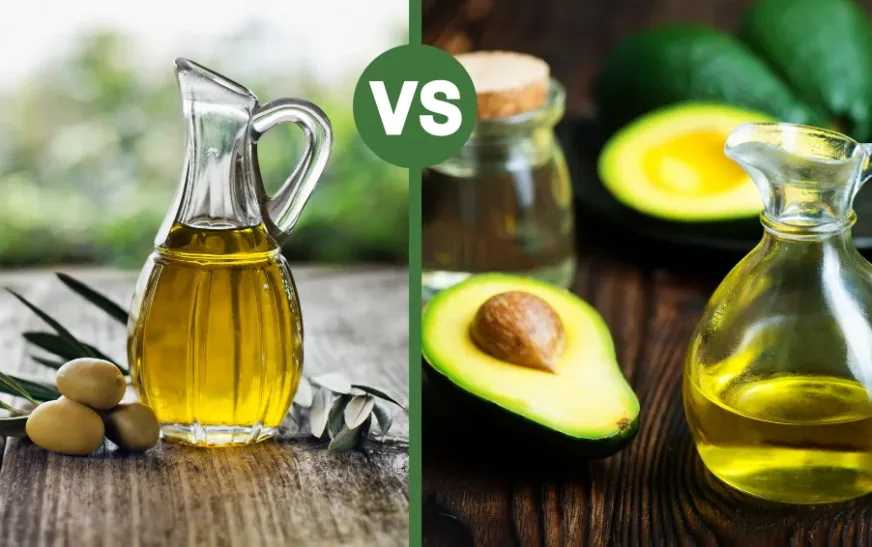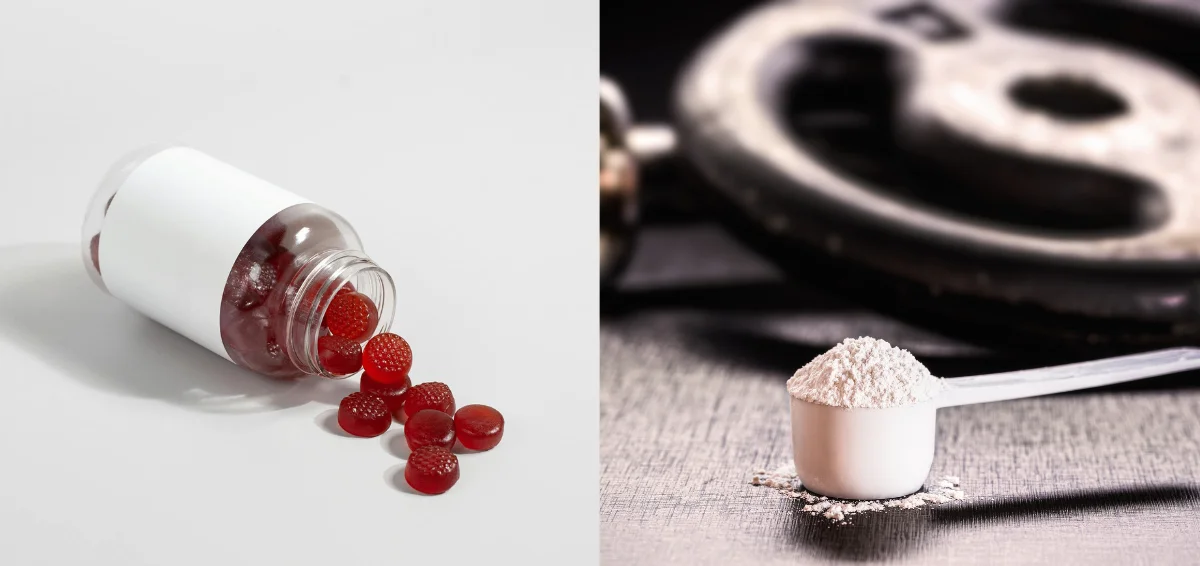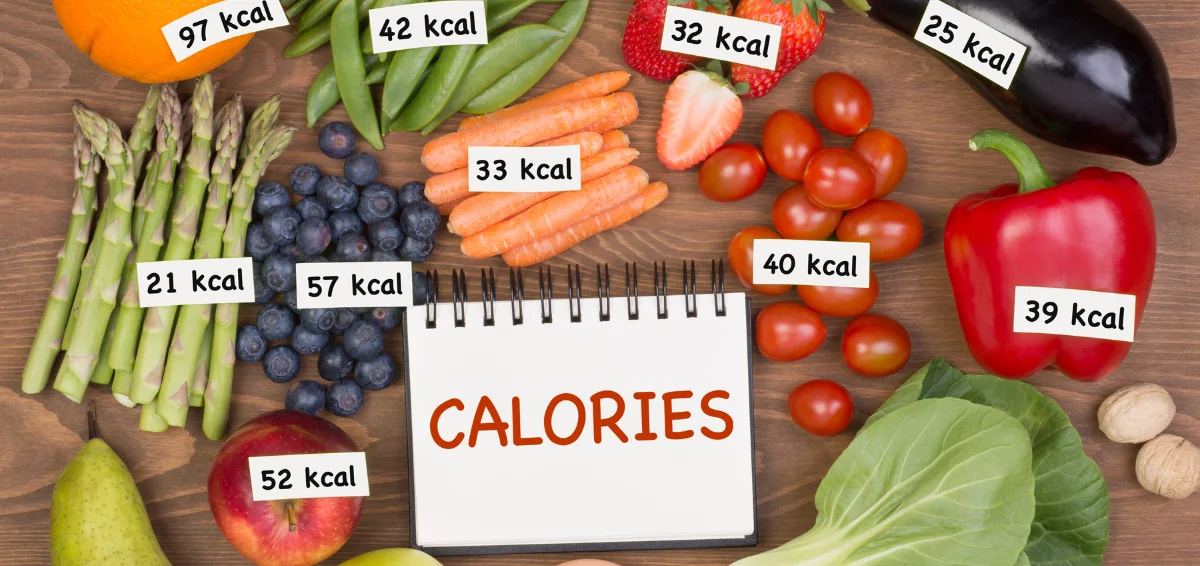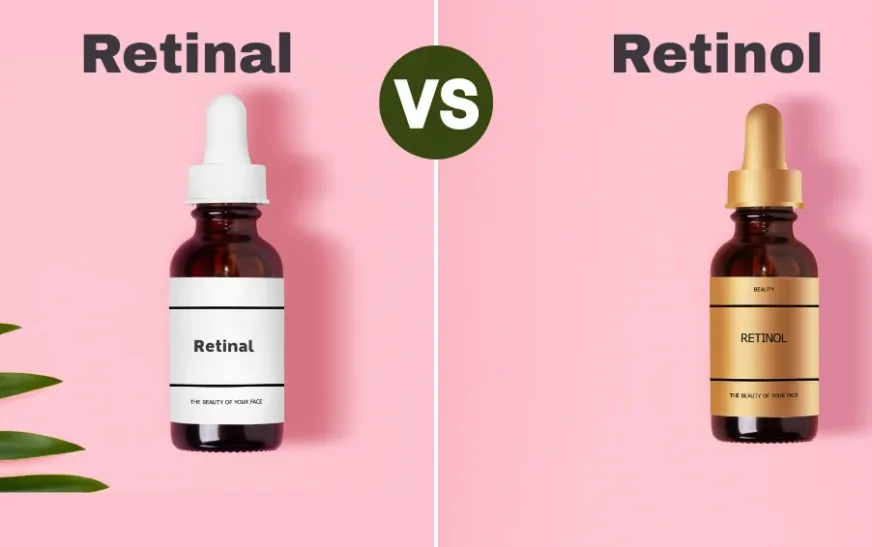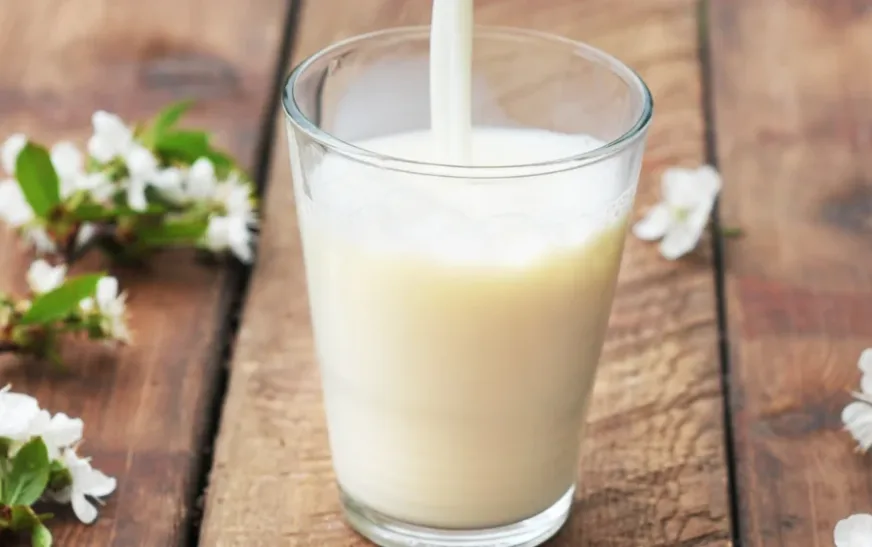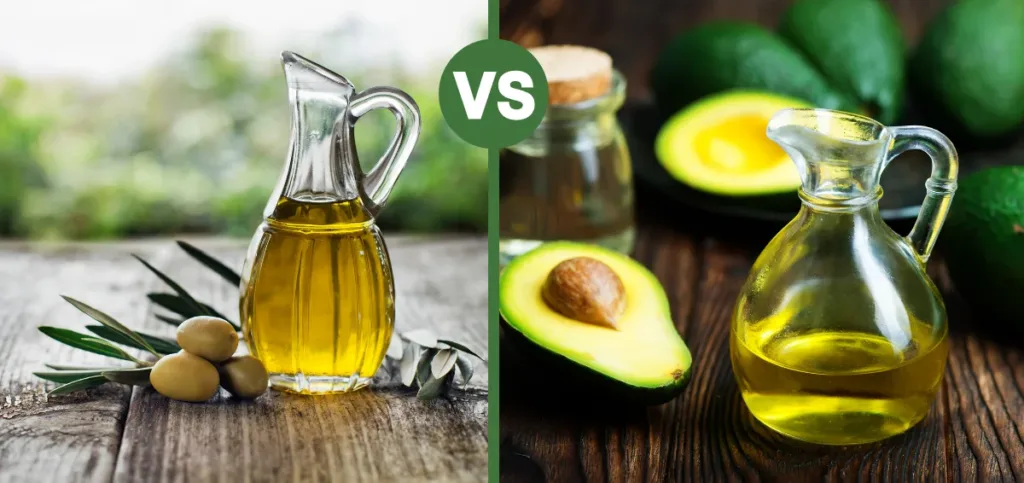
Olive oil and avocado oil are nutrient-rich oils used to prepare a wide variety of dishes. Despite boasting almost similar nutrition profiles, they vary significantly in taste, which makes their utility for preparing food items distinct. In this post, we’ll undertake a deep comparison of olive oil vs avocado oil.
Olive Oil vs Avocado Oil Nutrition Profile
When we compare the nutrition of olive oil and avocado oil, it becomes evident that they both have nearly the same calories and fat content. The oils comprise monounsaturated fats, which are good for your heart health. A slight difference is in the saturated and polyunsaturated fat content.
| Feature | Olive Oil | Avocado Oil |
| Calories (kcal) | 119 to 126 | 119 to 124 |
| Total Fat (in grams) | 14 | 14 |
| Saturated Fat (in grams) | 1.9 to 2.5 | 1.6 to 1.9 |
| Monounsaturated fat (in grams) | 9.6 to 10 | 9.9 to 10 |
| Polyunsaturated fat (in grams) | 1.3 to 1.5 | 1.4 to 2 |
| Vitamin E (mg) | 1.9 to 2 | 1.8 |
| Antioxidants level | High in polyphenols and lutein | Very high in lutein |
| Research done | Extensive (in Mediterranean diet) | Limited but growing |
Micronutrients in Olive Oil vs Avocado Oil
Olive oil and avocado oil are treasured for being sources of healthy fat and antioxidants. Still, the micronutrients, such as vitamins and minerals in these oils, have some differences.
| Micronutrient | Olive Oil (one tbsp) | Avocado Oil (one tbsp) |
| Vitamin E (mcg) | 1.9 to 1.94 | 1.8 |
| Vitamin K (mcg) | 8.13 | 0 |
| Calcium (mg) | 0.1 | 0 |
| Iron (mg) | 0.1 | 0 |
| Polyphenols | High | Low to Moderate |
| Lutein | Moderate | High |
| Phytosterols (mg/g) | 3.3 | 4.5 |
Vitamin E
Olive oil has a little more vitamin E than avocado oil. A tablespoon gives you 1.9–1.94 mg. The same quantity of avocado oil has 1.8 mg of vitamin E. Vitamin E maintains your skin, immune, and eye health.
Must Read: How to Avoid Seed Oils?
Vitamin K
Olive oil has close to 8.13 mcg of vitamin K per tablespoon. This vitamin is negligible in a tablespoon of avocado oil. Vitamin K supports your bone health and is important for releasing proteins like prothrombin in your liver.
Minerals
Olive oil scores more in being rich in minerals. The levels of potassium, calcium, and iron in it are higher than those in avocado oil. However, these minerals are present in extremely low amounts, such as 0.1 mcg. If you want to add more minerals to your diet, focus on cruciferous vegetables, nuts and seeds, and dairy items.
Antioxidants and Phytochemicals
Antioxidants in extra virgin olive oil and avocado oil are plenty. Olive oil is particularly rich in polyphenols like Hydroxytyrosol, oleuropein, and oleocanthal. Avocado oil has phytochemicals like carotenoids (especially lutein), which are not present in substantial quantities in olive oil.
Avocado oil also has phytosterols (primarily β-sitosterol), alkaloids in combination with polyhydroxylated fatty alcohol derivatives, or PFAs. These make the oil a great source of antioxidants and imbue it with cancer-preventative properties. Both oils help your body absorb fat-soluble vitamins, like A, D, E, and K, from food sources.
Which is Better for Cholesterol, Olive Oil or Avocado Oil?
Both olive and avocado oils are great for reducing cholesterol levels. They are filled with beneficial antioxidants that lower bad cholesterol through monounsaturated fat. They also increase good cholesterol, or HDL, which lowers blood pressure. The plant-based compounds in these oils have anti-inflammatory and antioxidant properties. Through these properties, diseases like heart disease are reduced significantly.
Olive oil, especially the extra virgin and high-polyphenol varieties, is backed by more evidence that supports their capability to lower LDL and improve good cholesterol function. Avocado oil has less direct evidence through studies on HDL function. So, you may focus more on olive oil if you aim to promote heart health.
Suitability for Cooking
Since these oils have slightly varying properties and nutrient profiles, they are suitable for specific cooking techniques. Here, you should note the smoke point. High-heat cooking techniques like frying, roasting, and grilling need oil with a high smoke point. Avocado oil, with a smoke point of 520°F, is preferred for these types of cooking over olive oil, which has a 350°F smoke point.
For medium-heating cooking, like sautéing, roasting, and baking, olive oil is much preferred. If the temperature in your medium-heat cooking is between 325°F and 375°F, use extra virgin olive oil. If the temperature requirement is above this range, you can use refined and virgin olive oil.
Differences in Taste & Flavour
Avocado oil has a less intense taste than olive oil. If you don’t pay attention, you may not be able to feel a specific taste. Avocado oil is pressed from the pulp that surrounds the seed. It has a light, buttery, and nutty taste and a neutral flavor. Don’t expect the taste of avocado on your tongue with this oil. The mild flavor allows you to use avocado oil in place of vegetable oil or canola oil when baking goods, marinating, or in salad dressings.
High-quality extra-virgin olive oil has a subtle yet rich olive flavor. This taste is smooth and buttery. Note that different types of olive oil have varied tastes. Those from Spain have a fruity profile, and whole olive oils from Italy have a grassy flavor. Olive oils from Turkey have a spicy finish.
Must Read: Is Guacamole Healthy?
Versatility for Cooking
The high smoke point of avocado oil allows you to cook or prepare a greater variety of food items than olive oil. You can prepare many items while sautéing and stovetop grilling with it, such as:
- Pan-seared salmon
- Crispy salmon
- Bacon and Butternut Quinoa Fritters
- Meat dishes
- Egg rolls
- Pasta
- Baked cakes and breads
Despite the lower smoke point of olive oil, it remains stable at high heat. This makes it ideal for preparing the following items:
- Baked items like spaghetti squash and pasta
- Fried chicken
- Baked fish
- Slow-roasted salmon
- Olive oil cookies
Concluding Words
Olive oil and avocado oils are both heart-healthy oils consisting of monounsaturated fats. There are only slight differences in saturated and polyunsaturated fat content. Major differences are in their taste, flavor, and smoking point. This makes them suitable for different cooking techniques. If you want to get the most health benefits, use the extra virgin or unrefined varieties.

